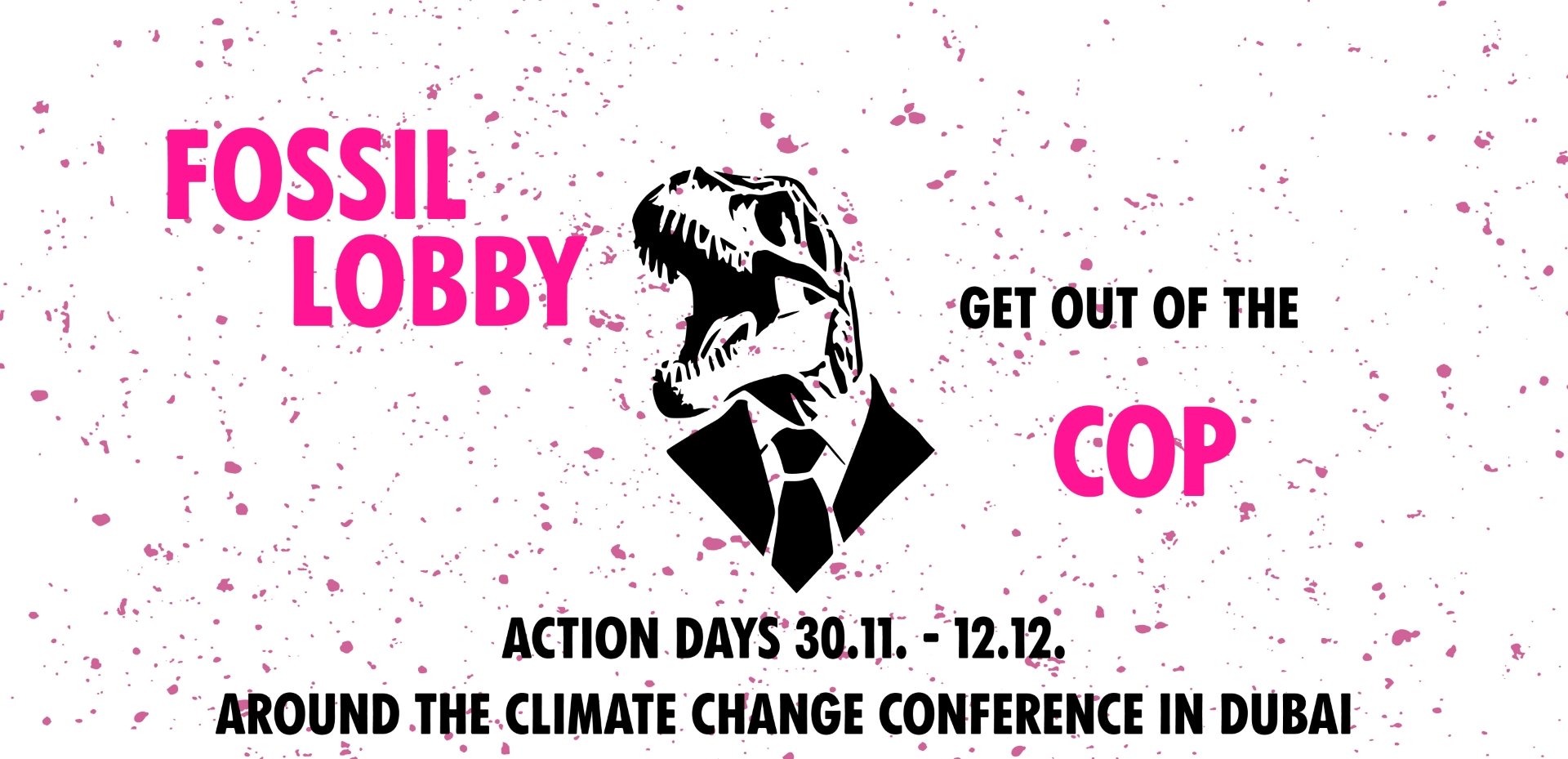
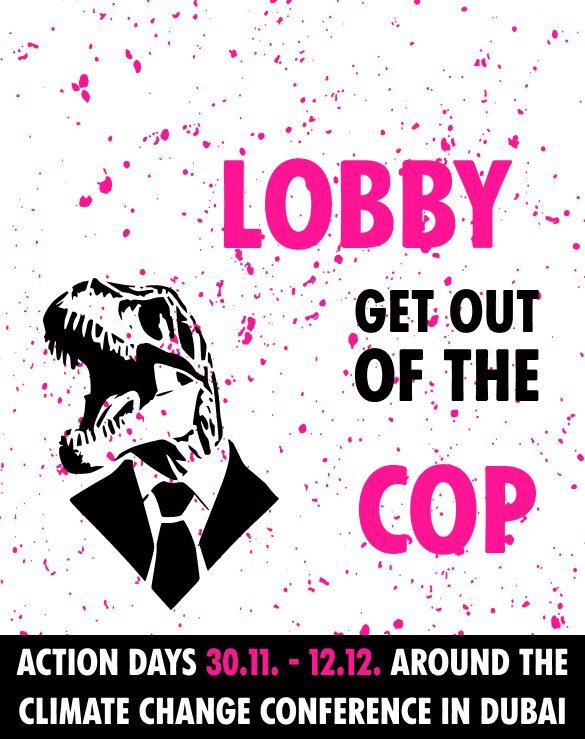
– 🇩🇪 Deutsch –
Fossil fuel lobby - get out of the COP!
Libya is being flooded, Greece is burning - at the same time, the COP is being controlled by fossil fuel interests. The 28th climate change conference (COP28) is taking place in Dubai, hosted by oil compaies and the fossil fuel lobby.
Are you kidding?! That's the equivalent to arms dealers negotiating peace or the tobacco industry running the World Health Organisation. The fossil fuel lobby is torching our home and is now playing fireman.
During the COP from 30th of November to 12th of December, we are calling for a protest against the fossil fuel lobby and for structural change at the COP.
Those affected by climate change must make the decisions - not the fossil lobby!

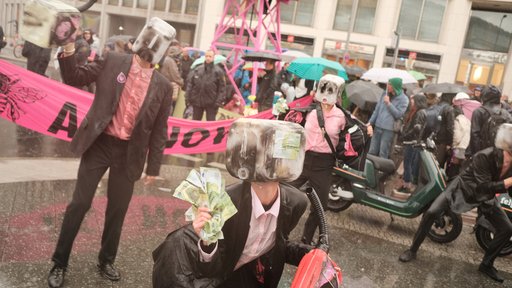
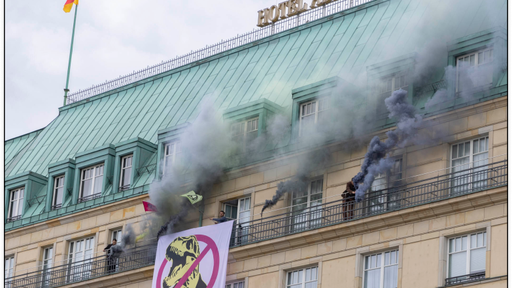
Actions and Events
Every day at all times! Your action or event is not listed here yet? Then let us know!
- 24.11.-30.11. COP Ad Absurdum - decentralized XR-actions in several cities
- 30.11.-04.12. Action week #Howmuchmore by Scientist Rebellion in Berlin
- 01.12. Power Up Action on the COP in Berlin
- 02.12. Registered Swarming around the COP in Bonn
- 02.12. Projections in Berlin
- 02.12. 14 Uhr Scientists' March in Berlin
- 04.12. Decolonize COP!? Diskussion in Berlin
- 06.12. St. Nicholas' Day Ride: Respect Cyclists bike protest
- 07.12. Court hearing on the speed limit in Berlin
- 07.12. Legal street blockade around the COP in Dresden
- 08.12. Women, Sinti*zze and Rom*nja in resistance - Tour of the German resistance memorial
- 09.12. 11 am Turning off the tap on Tesla - blue ribbon campaign against Tesla
- 09.12. 2 pm Stop fossil subsidies - mass civil disobedience action in Berlin
- 10.12. 6 pm Küfa for communities in resistance - photos and printed material with delicious Guatemalan food
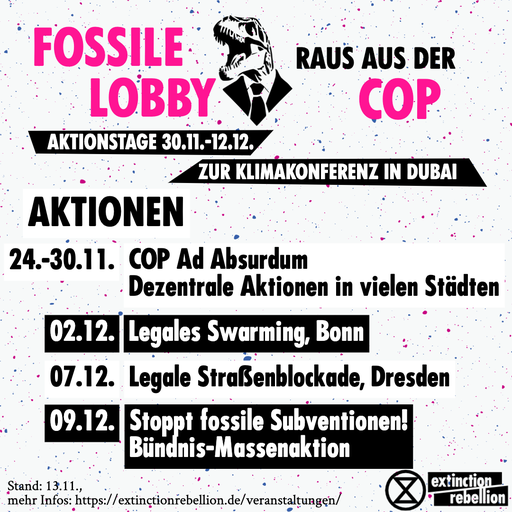
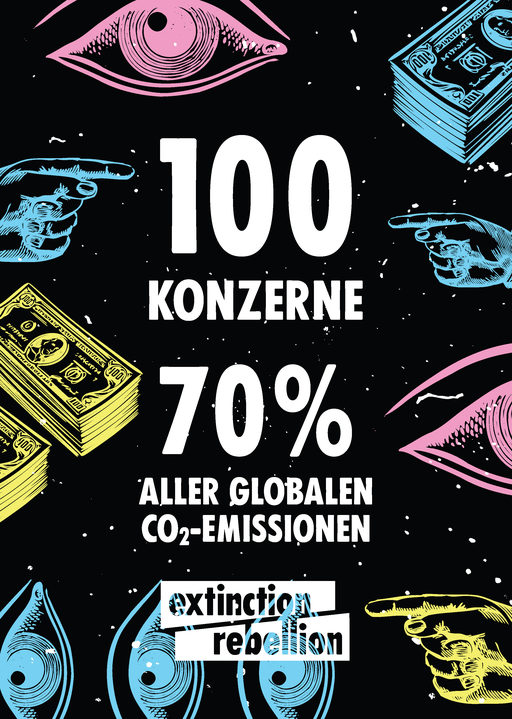
How the fossil fuel lobby is blocking climate protection
The fossil fuel lobby, led by companies such as Exxon, one of the world's largest oil companies, has been at the forefront of blocking climate protection for decades. As early as the 1970s, Exxon was able to accurately predict its own contribution to the climate crisis while denying the link between global warming and fossil fuels. Lobbying organisations, think tanks and PR strategies are giving climate deniers a plattform, criminalising climate activists and shifting responsibility onto consumers.
For example, In the 2000s, BP changed its name from BP - British Petroleum to BP - Beyond Petroleum in an ingenious marketing coup and publicised the concept of the carbon footprint worldwide.
But despite their supposedly green and climate-friendly messages, the oil companies have so far failed to fulfil their promises. On the contrary: none of them are planning to significantly reduce oil production before 2030, and it is even set to increase by 2028. The self-imposed "climate targets", emission reductions and investments in renewable energies are taking a back seat to short-term profits from fossil fuels.
Despite modernised messages, the declared aim of this industry remains unchanged: to delay effective climate protection measures in order to protect its own profits.
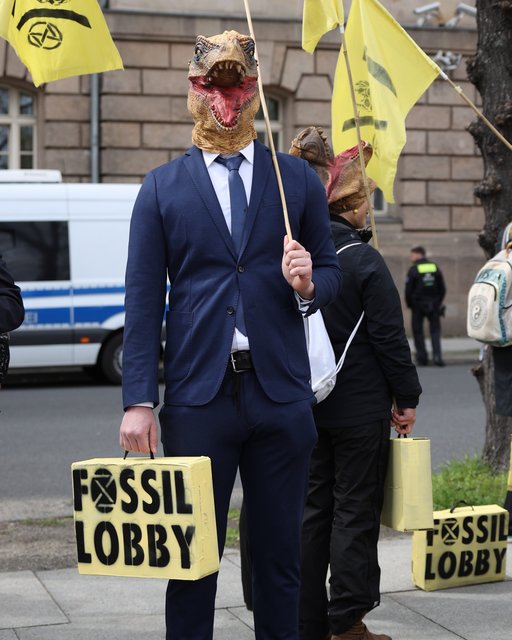
The fossil fuel lobby and the COP
The UN Climate Change Conference COP 28 is taking place from the 30th of November to 12th of December in the megacity Dubai in the United Arab Emirates. This is the first time that a global stocktake will take place to assess how the global community is doing in terms of climate policy. The climate targets and their implementation are then discussed on that basis. A binding phase-out date for fossil fuels or fixed expansion targets for renewables are possible. Other key points are the organisation of the climate fund for loss and damage agreed at COP 27 and climate adaptation strategies.
https://www.klimareporter.de/tag/cop-28
“"The countries that live from exporting oil and gas have earned more than ever before. And many of them are now fighting to extend this business model. They are counting on the COP in one of the most important oil countries to pave the way for this."”
– Climate expert Christoph Bals from Germanwatch
This year's UN Climate Change Conference in Dubai with the CEO of the Abu Dhabi National Oil Company (ADNOC) as President of COP28 is just the sad climax in a long series of failed climate conferences manipulated by fossil fuel interests.
Lobbying at the COP is a tradition
It is hardly surprising that this year's COP28 conference is being held in Dubai after the United Arab Emirates sent more than 1,000 delegates to the previous conference in Egypt, 70 of whom were oil lobbyists, as noted by Global Witness. At the Sharm el-Sheikh conference, more than 600 lobbyists from the oil and gas industry were present, a number that exceeded the total number of delegates from the ten countries most affected by the climate crisis.
„“The explosion in the number of industry delegates attending the negotiations reinforces the conviction of the climate justice community that the industry views the Cop as a carnival of sorts, and not a space to address the ongoing and imminent climate crisis,” said Kwami Kpondzo from Friends of the Earth Togo.“
According to an analysis by CEO and Corporate Accountability, 18 out of 20 sponsors and partners of last year's climate negotiations directly support the fossil fuel industry or work with it. As a result, Saudi Arabia, China, Russia and other fossil fuel producing countries blocked the formulation of a final resolution at the last COP that would have set a timeline for phasing out oil and gas, preventing an outcome favoured by most of the world's countries.
This presidency has already provoked sharp criticism. A transatlantic letter signed by 133 members of the US Congress and the European Parliament called for the withdrawal of the nomination of Sultan Al Jaber as COP28 President - an unprecedented move in the 30-year history of the negotiations.
Although new transparency rules for the COP28 registration process were introduced this year, requiring all participants to disclose their links and relationships with the respective nominating organisations, it is only a first tentative breakthrough that shows: we have a problem.
Expansion of fossil fuel extraction in the UAE is at odds with the global climate target of 1.5°C
The United Arab Emirates are very keen to emphasise the expansion of renewable energies. A look at the planned investments shows the absurdity of this self-staging: The announced 30 billion dollars for the Masdar flagship project amounts to less than a quarter of the ADNOC's spending target of 150 billion dollars. The eleventh largest oil and gas producer is thus planning to expand its oil production capacities over the next five years - even if 90% of this needs to remain in the ground in order to fulfil the International Energy Agency's net zero scenario.
The COP is degenerating into a greenwashing platform for polluters
Although the UAE has announced more ambitious climate targets, the country has not yet taken adequate measures to achieve them. Al Jaber, also the "UAE Special Envoy for Climate Change", is in favour of a gradual reduction in fossil fuel emissions rather than phasing out fossil fuels. The energy transition must not jeopardise the world's energy security and prosperity. Translated, this means that it is not yet possible without fossil fuels - a classic "discourse of climate delay". The strategy for the urgently needed energy transition is based solely on expensive and not yet established technologies such as carbon capture and storage (CCS).
Fossil fuel companies use CCS as an excuse to maintain business models that escalate climate change
CCS refers to the capture of carbon dioxide from the air and industrial waste gases, followed by underground injection. This technology, which temporarily removes CO2 from the atmosphere, is seen by some countries as a beacon of hope for climate protection. However, CCS is not as climate-friendly as claimed. The technology is prone to CO2 leakage and represents a burden for future generations. CCS is also misused for greenwashing as reasoning to label fossil fuel business models as climate neutral.
"The climate emergency needs action, not words," said Tasneem Essop, Executive Director of Climate Action Network International. "Although Al Jaber is calling for bold action to keep the temperature below 1.5°C, his actions don't match his rhetoric."
Human rights situation
The UAE's invitation to Syrian dictator Bashar al-Assad has caused further resentment in Western capitals, which are opposed to his diplomatic rehabilitation. The organisation of such a high-profile event has also put the human rights situation in the autocracy under renewed scrutiny. Civic groups have called for the release of dozens of political dissidents who have been imprisoned since 2012, many of whom remain in detention even after their sentences have expired. According to the activists, authorities label the detainees as terrorist threats
„In the UAE, peaceful dissent through expression, association or peaceful assembly is severely restricted or criminalized, public assemblies require government approval, and dozens of critics of the government are in jail.
Rather than make an exception related to this two-week meeting, the UAE should permanently do away with these restrictions, as well as the many other curbs it imposes on human rights, and make amends for previous abuses.“ (https://www.amnesty.org)
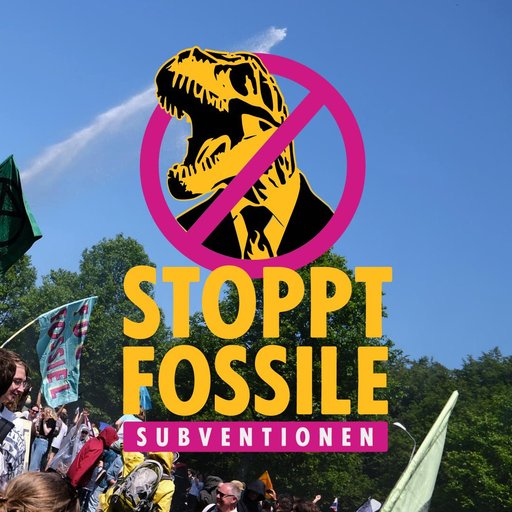
Fossil Subsidies
Also the German government is complaining that the COP is being held in Dubai and is criticising the oil countries for their fossil fuel plans. Yet, the situation in Germany is no better. The German government is supporting the fossil fuel lobby with gifts worth billions. Every year, it pours 70 billion eEros into the combustion of oil, gas and coal. These fossil fuel subsidies must be stopped. Instead, they could be used to pay for a proper basic child insurance scheme or the €49 public transport ticket.
The time for fossil fuel subsidies in Germany is over - it is high time to end financial support for gas, coal and oil. It seems absurd that billions are flowing into energy sources that pollute our environment and jeopardise our climate goals. Continuing these subsidies hinders our endeavours towards a sustainable future. It is time to change course and promote investment in renewable energy and climate-friendly technologies.
These measures should be part of a smart funding policy based on consistent design. Support programmes must have clear objectives and be easily accessible to enable rapid implementation. A focus on zero-emission technologies is crucial to drive the transformation. Ultimately, these steps offer a double opportunity - reducing expenditure and generating revenue for future climate-friendly investments. It is not only ecologically but also economically necessary to end the subsidisation of fossil fuels.

Our house on fire
In the summer of 2023, no continent was spared the devastating effects of extreme weather phenomena - be it the dramatic melting of ice, devastating floods, storm surges, heat waves, forest fires or landslides. A true natural disaster that affected not only the environment, but also human communities around the world. At the same time, numerous conflicts were exacerbated by poverty, hunger and thirst, resulting in flight becoming the only means of survival for many people.
These tragic events highlight not only the human toll, but also the urgent reality of climate change. These extremes are not isolated incidents, but are exacerbated by human activity. It is a wake-up call that climate change is not just a distant threat, but is already threatening lives and livelihoods today.
Particularly shocking in the midst of this global crisis is the unprecedented ignorance of the banks. Despite the obvious link between fossil fuels and this destruction, they continue to recklessly invest in such projects around the world. An irresponsible decision that deliberately contributes to the escalation of environmental degradation and an alarming testimony of carelessness and indifference to the pressing challenges facing our planet.